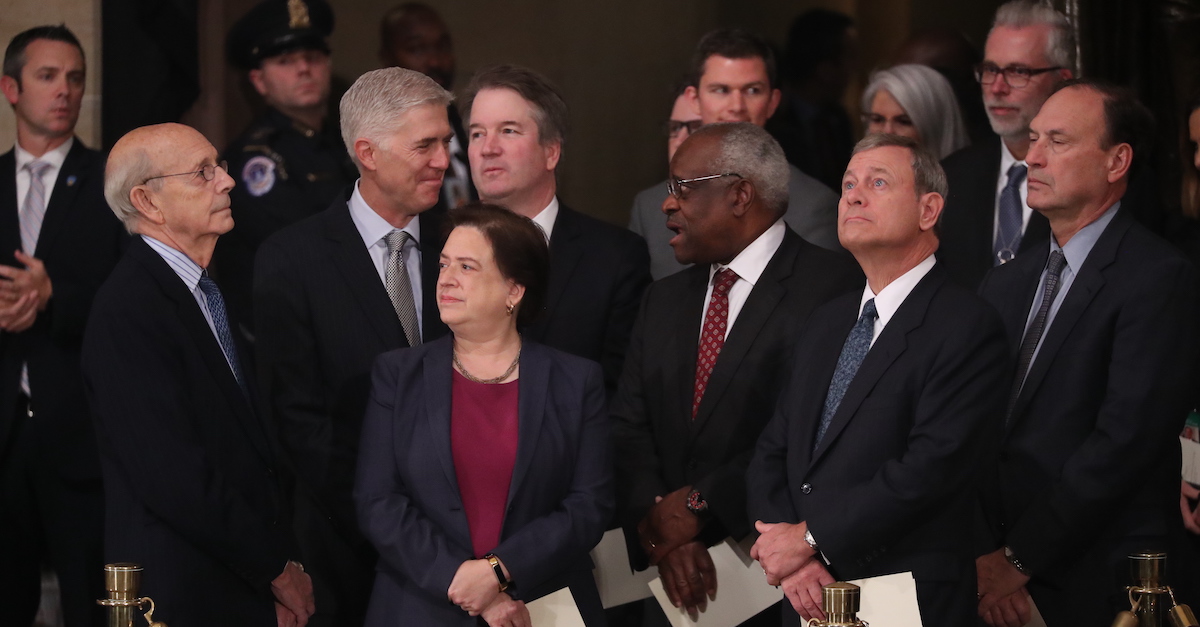
Various Pennsylvania Republican Party leaders asked the U.S. Supreme Court to disallow counting of mail-in ballots that are received after Election Day in an emergency motion on Monday.
The Pennsylvania Supreme Court recently ruled in favor of Keystone State Democrats by permitting mail-in votes to be counted so long as they are received within three days of Election Day.
Such mail-in votes are to be tabulated by local elections officials provided that ballot envelopes clearly show they were mailed by November 3–or even if they are not if the lack of such a postmark is likely the result of error(s) by the U.S. Postal Service (USPS).
“[W]e conclude that a ballot received on or before 5:00 p.m. on November 6, 2020, will be presumed to have been mailed by Election Day unless a preponderance of the evidence demonstrates that it was mailed after Election Day,” the court ruled earlier this month. “We emphasize that voters utilizing the USPS must cast their ballots prior to 8:00 p.m. on Election Day, like all voters, including those utilizing drop boxes.”
The original Democratic challenge to Pennsylvania’s “burdensome” election laws was fashioned as a response to the ongoing novel Coronavirus (COVID-19) pandemic and its relationship to the currently in-progress general election. Similarly, the Pennsylvania Supreme Court couched their opinion in reference to the “various challenges” posed by the pandemic and the concomitant upsurge in mail-in voting due to fears of contracting the deadly virus.
The GOP motion for a stay invoked the election and U.S. Constitution.
“In the middle of an ongoing election, the Supreme Court of Pennsylvania has altered the rules of the election and extended the 2020 General Election beyond the ‘Time’ established by the state legislature pursuant to Article I, Section IV of the U.S. Constitution,” the motion alleges. “In doing so, the Supreme Court of Pennsylvania has violated federal law and the federal Constitution.”
The filing claims the state court’s decision is likely to introduce an unstable element into the balloting process [emphasis in original]:
[T]he decision of the Supreme Court of Pennsylvania forces officials to count ballots received up to three days after Election Day even if they lack a legible postmark or any postmark at all. This is an open invitation to voters to cast their ballots after Election Day, thereby injecting chaos and the potential for gamesmanship into what was an orderly and secure schedule of clear, bright-line deadlines.
Republicans also called attention to Pennsylvania’s decidedly outsize role in the 2020 presidential contest between President Donald Trump and former vice president Joe Biden–pleading with the high court’s conservative majority to essentially take a hands-on role stewarding the tidy disposition of that battle.
“In a year where there is a very real possibility that the final presidential election result hinges on Pennsylvania, the new rules imposed by the decision of the Supreme Court of Pennsylvania (a body elected in partisan elections) could destroy the American public’s confidence in the electoral system as a whole,” the motion argues.
The GOP legislative leadership’s filing rests on two main arguments: (1) that the Pennsylvania Supreme Court’s order is in violation of a federal statute that sets Election Day as “the Tuesday next after the 1st Monday in November” because the loosening of mail-in ballot restrictions effectively “extends Election Day”; and (2) that the Pennsylvania Supreme Court’s order is in violation of the U.S. Constitution because it allegedly “usurps” elections authority from the commonwealth’s elected officials.
Notably, Pennsylvania’s own elected GOP leadership may lack standing to file such a lawsuit–but a substantially similar (and much shorter) emergency application for a stay was also filed late Monday by attorneys representing the state’s Republican Party organization. The second filing relies upon largely the same legal theory and was filed by Trump’s former acting assistant attorney general for the Department of Justice Civil Rights Division John Gore.
Attorney General Bill Barr also appears to be keenly aware of Pennsylvania as crucial to the 45th president’s re-election prospects.
The GOP request was filed with conservative Justice Samuel Alito, whose purview contains writs for certiorari in cases that would otherwise be heard in the U.S. Court of Appeals for the 3rd Circuit in Philadelphia. Alito may refer the motion to the rest of the court.
The applications to SCOTUS come at a time when there are only eight sitting justices, given the Sept. 18 death of Justice Ruth Bader Ginsburg. President Trump has already nominated Circuit Judge Amy Coney Barrett, but confirmation hearings are not expected to begin until Oct. 12. Supreme Court arguments begin again on Oct. 5.
Read both of the motions below:
GOP Legislative Leaders Emergency Application by Law&Crime on Scribd
GOP State Party Emergency Application by Law&Crime on Scribd
[image via Jonathan Ernst – Pool/Getty Images]